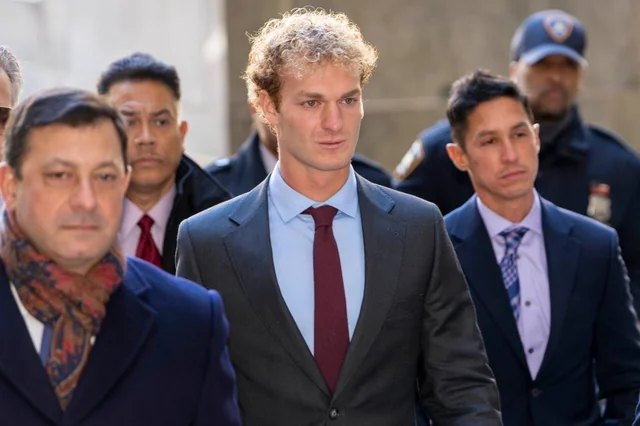Daniel Penny Found Not Guilty in Death of Jordan Neely: Acquittal Sparks Nationwide Debate
New York City — December 11, 2024 — Former Marine Daniel Penny was acquitted of negligent homicide by a Manhattan jury today in the highly contentious case surrounding the death of Jordan Neely, a homeless man with a history of mental health struggles. The jury’s decision has reignited national debates about race, homelessness, mental health, and public safety in urban areas.

New York City — December 11, 2024 — Former Marine Daniel Penny was acquitted of negligent homicide by a Manhattan jury today in the highly contentious case surrounding the death of Jordan Neely, a homeless man with a history of mental health struggles. The jury’s decision has reignited national debates about race, homelessness, mental health, and public safety in urban areas.
The incident occurred on May 1, 2023, aboard a crowded New York City subway car. Witnesses reported that Neely, 30, who was known for his street performances impersonating Michael Jackson, was shouting about his hunger and making threatening statements, which reportedly caused panic among passengers. Penny, 24 at the time, intervened by placing Neely in a chokehold, a maneuver that ultimately led to Neely’s death.
The defense argued that Penny acted out of a genuine fear for the safety of those on the train, portraying him as a Good Samaritan who made a tragic but understandable decision in a moment of chaos. The prosecution countered that Penny’s actions were excessive and showed a reckless disregard for Neely’s life, pointing to the duration of the chokehold and Neely’s lack of physical assault as evidence.
“This was not an act of vigilantism,” Penny’s attorney said during closing arguments. “It was an instinctive reaction to protect others. Daniel Penny did not wake up that morning intending to harm anyone.”
The jury’s verdict, delivered after three days of deliberation, was met with mixed reactions. Supporters of Penny argued that the decision was a vindication of self-defense rights, particularly in a city grappling with rising concerns about public safety. Critics, however, viewed the acquittal as another example of systemic failures to address racial disparities and the criminalization of homelessness and mental illness.
Neely, a Black man, had a long history of mental health challenges and was experiencing homelessness at the time of his death. Advocates for the homeless community have pointed to systemic neglect as a root cause of the confrontation, emphasizing the need for better support systems rather than punitive measures.
“Jordan Neely needed help, not a chokehold,” said Reverend Al Sharpton, who has been a vocal advocate for Neely’s family. “This verdict sends a chilling message about how we treat the most vulnerable among us.”
The case drew significant media attention and protests, with demonstrators on both sides of the issue gathering outside the courthouse throughout the trial. Social justice organizations decried the verdict as a miscarriage of justice, while some conservative commentators praised the outcome as a triumph for common sense in dangerous urban environments.
New York City Mayor Eric Adams released a statement urging calm and reflection in the wake of the decision. “This case underscores the urgent need to address the intersecting crises of mental health, homelessness, and public safety,” Adams said. “Our city must do more to ensure that tragedies like this never happen again.”
Neely’s family, visibly emotional after the verdict, expressed their disappointment but vowed to continue their fight for justice and mental health reform. “Jordan’s life mattered,” said a family spokesperson. “We hope his story will inspire change so no other family has to endure this pain.”
As the nation processes the jury’s decision, the broader issues raised by the case remain unresolved. Advocates and policymakers alike are calling for urgent reforms to tackle the complex challenges at the heart of this tragic event, from improving mental health services to addressing systemic inequities in the justice system.
The Manhattan trial conducted against Penny has been characterized by stark divisions. The jury had previously deadlocked on manslaughter charges, prompting the judge to dismiss the more serious accusations. Eventually, Penny walked free, dishing out another blow to those advocating for accountability within the framework of systemic racism and mental health treatment failures.
For many, including Neely’s family, the verdict sent shivers down their spines, emphasizing what they see as deep-rooted racial inequalities embedded within the justice system. Jordan Neely’s father outlined his pain, describing the legal proceedings as emblematic of a rigged system, stating, “It hurt me to my core … this system could be rigged the way it is.” His perspective embodies the anger felt by many who support Neely and criticizes the lack of stringent regulations surrounding interactions involving the homeless and mentally ill populations.
The intersection of Neely’s death and Penny’s acquittal calls attention to the broader societal challenges related to mental health care. Activists contend this is not merely about one unfortunate death but the compounded failures of the state to effectively address and support individuals with mental health issues, especially within marginalized communities. Protests have erupted sporadically as advocates continue to demand justice and reform.
Following the trial verdict, grassroots activists held guerilla protests within subway stations, symbolically reenacting key moments from Neely’s life to spotlight the larger issues of mental health, homelessness, and systemic injustice. Banners reading “Homelessness is Not a Crime” and “Justice for Jordan” peppered the crowded subway platforms as protesters sought to claim space for the often-silenced struggles of individuals facing systemic challenges.
One anonymous organizer from the protest stated, “This is about every person who has been failed by the system, whose humanity has been disregarded. We will not allow his story to be erased.” The duality of reactions among subway riders showcased the polarizing sentiments surrounding both the incident and the acquittal. Some commuters voiced support for Neely’s cause, countering with frustrations about disruptions to their daily commute.
The backdrop of the trial is rich with historical significance; it wasn’t the first time the conversation about vigilante justice and race has entered the mainstream discourse. The incident draws parallels to previous cases, like the infamous Bernie Goetz case of 1984. Like Penny, Goetz was deemed by some as defending fellow riders during violent encounters. Yet, each case illuminates different societal fears and narratives around race, crime, and the exercise of perceived rights to self-defense.
New York City Mayor Eric Adams highlighted the pressing need for reform after the verdict, admitting, “We have a mental health system that’s broken. When you have someone repeatedly going through this system, that’s a signature of failure.” His remarks seek to acknowledge the systemic flaws impacting individuals like Neely, who experienced both neglect and abuse by societal structures meant to protect them.
Critics of the acquittal, including civil rights advocates and Neely’s family, have consistently stressed the urgent need for changes to local law enforcement and mental health support systems, pointing to Neely’s record of treatment challenges. His repeated interactions with mental health services and the police call attention to the inadequacies of the existing approaches available to vulnerable populations.
Further complicating matters, Penny’s actions have reignited discussions around self-defense laws and what constitutes justifiable force. Supporters defend Penny, arguing his decision was made under acute pressure and panic, reflective of many ordinary citizens facing similar threats on public transport systems. Yet detractors argue it is too often white individuals like Penny who walk free after lethal encounters with people of color, exposing the frailty of justice for marginalized groups.
The jury’s decision leaves many grappling with the reality of what it implies about American justice. If the state can absolve individuals from criminal liability for actions taken under these circumstances, where does it leave those who are often the most vulnerable? The conversations and tensions triggered by the case highlight ingrained societal fear, anger over perceived injustice, and the persistent challenges faced by New York City’s homeless population, particularly those battling mental health struggles.
The country is at a crossroads concerning broadly defined laws of self-defense and public safety. The impacts of Penny’s acquittal will likely reverberate long beyond the courtroom scuffles and subway protests, continuing to shape the dynamics of race, public health, and collective justice across the nation. Advocates remain steadfast, promising to persist with actions aimed at raising awareness and addressing the neglected systems behind tragedies like Neely’s death. Community rallies, social media campaigns, and calls for legislative changes are already part of the larger conversation spurred by this contentious trial.




